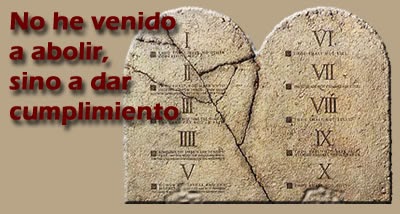Not too long ago I found myself in a conflict over the applicability of the Law of Moses in our times, a concept known as theonomy. Theonomy is just a technical word for the idea that God’s Law/Word is the ultimate source of ethics and the rule of law for all mankind in all times and that means the Law of Moses, at least in principle.
For some reason, the very word provokes violent reactions against it in some circles. There are seminaries that will not allow pro-theonomic books in their libraries or bookstores while openly promoting books critical of the position.[1] The authors who reject theonomy out of hand misrepresent it and debate the misrepresentation, a logical fallacy called a straw man argument. Often these arguments are character assassinations and gross misrepresentations. I’ve heard theonomy called legalism, anti-Semitic, puritanical fascism and a conspiracy to overthrow the government. None of this is remotely true.
I have personally been blackballed by those who disagree with me without so much as an investigation of the facts or even being asked to explain what I believe. We live in times when prejudice has replaced analysis. We used to believe that the best way to silence a false argument was to refute it. Could it be that that the opponents of theonomy are unable to refute it? These are sincere people who believe they are defending the faith. If so, why shut down all discussion?
A dear friend who does not share my perspective observed that my counterparts in the conflict brag about living by grace but demonstrated less grace in practice than those who acknowledge the law, namely me.
To encourage me my friend sent me a devotional by Chuck Swindoll about the law. It was titled “The Legal Swamp. The text was 1 Corinthians 6:1-8.
Now, I love Chuck Swindoll. He was my parents’ pastor for many years at the Evangelical Free Church in Fullerton, California. When I was a student at Dallas Theological Seminary Dr. Swindoll was the president. My father had terminal lymphoma at the time. I approached Pastor Chuck and asked if he remembered my parents. He said yes. I thanked him for his ministry to them and told him about my dad’s illness. A day later I received a hand written note in my student mailbox from Chuck to my parents encouraging and consoling them. That impressed me. This was a guy who knew the sheep he was given to tend for the Master.
I respect Pastor Swindoll but I don’t agree with his take on the law in this devotional. It starts off like this:
“Law never fails to turn me off.
Don’t get me wrong. It’s not that I don’t think we need it . . . it’s just that it leaves me cold. It frowns and demands. It requires and warns and threatens. With a grim glare, it dares us to forget its rules or even think about disobeying its regulations.
I know, I know. It protects us. It gives us recourse when we’ve been assaulted or abused. It’s the ultimate big stick we can wave in the face of an adversary. «I’ll sue!» has therefore become our favorite national slogan, which fits perfectly into our me-ism society.
«I’ve got my rights.»
«I’ve got it coming to me.»
«I don’t have to take that from you.»
Those are the overused words of our overkill generation. Parents are now being sued by their children. Teachers are being sued by their pupils. Coaches are being sued by their players. Spouses are being sued by their partners, and it isn’t limited to unbelievers. Christians are now neck deep in the legal swamp. Christian neighbors sue each other. Christian faculty members are now filing suit against the administrations of Christian schools. Churches not only sue one another, congregations now sue their pastors—and vice versa. Parishioners who have complaints about the counseling they received from their ministers are turning to the courts to voice their anger and to seek a financial settlement.”
All true and a sad state of affairs but is the Law the problem? Are we short on grace? I don’t see it that way. The perfect Law of God is something to delight in, to meditate on day and night. It is the law of liberty. The devotional is well meaning and honest but it reflects the false dichotomy of law vs. grace and an antinomian theology.[2]
As I read it, the devotional is a good description of the conflict between humanistic law and the Law of God. If we obeyed the law of God, if we really believed that God has the authority to provide objective law and has done so, if we therefore studied and knew the law, we would not be doing the things Chuck outlines in this devotional.
The lack of grace in a conflict by those who cry the loudest about grace is the natural fruit of rejecting the law. If you do not believe in the law you will see no problem in crucifying your opponent behind his back. Ignoring the legal procedures for dealing with offenses by holding court in private and pronouncing sentence without the accused present is not a problem. We’re under grace, not the law.
What happens when a people ignore God’s law is what Pastor Chuck describes here. We have been taught the law is a horrible thing to be avoided. As a result we never really studied it. Neither have we taken the time to review original sources of those who argue that the Law of Moses is still in force, at the very least, in principle.
A friend in Africa, Chuks Ezemandu, recently wrote the following excellent explanation of theonomy:
The Laws of Moses applied in Christ is the basis for individual, family, Church and societal sanctification; powered by the Holy Spirit. Whoever hears Moses will hear Christ. Christians should honor the law of Moses just because the words of Christ require us to do so. Theonomy is not a matter of hearing Moses instead of Christ, but rather hearing Moses because of Christ.
Matthew 18:15-20, the passage we so often use for peacemaking, is an exposition of the law in Deuteronomy 19:15. The law prohibits anyone from bringing a charge in public without at least two witnesses. Jesus says that means by law you have to go to the accused in person and in private before you make a charge public.
Without the law, there is no grace. Grace, like mercy, operates within the law, not outside it. Think about it for a moment. If there was no infraction of the law, what would grace mean? Nothing. It would be permissiveness. The law of God is anything but demanding your rights. But we don’t know this because we’ve been inoculated against it. In most cases we were born into the faith with an allergic reaction to the law. It is an inherited spiritual characteristic from those who led us to the Savior and discipled us.
Mankind will always be governed by some system of law. The question is not law vs. grace but in which law system will grace operate. Manmade law systems have no room for grace, they are brutal and cruel. When we pit law against grace we nullify God’s law and in effect say any law but God’s Law. The real battle throughout history has not been law vs. grace but God’s law vs. man’s law.
Grace works our salvation by what means? By Christ’s death on the cross. His sacrifice did not nullify the law, rather by it He paid the penalty for our sin. Sin is lawbreaking. Breaking which law? God’s of course. If the law were not the immutable standard of God’s character Christ’s death would be unnecessary and meaningless.
When Paul says we are under grace and not under the law he means we are no longer under the death sentence of the law and are set free to live according His law and we are empowered by the Holy Spirit to do so. But we have to study it to know it. Christianity is not a mystery religion where the Spirit magically speaks to us about what is right and wrong. It’s written down for us.
I thought it ironic that the passage for Chuck’s devotional was 1 Cor 6:1-8. It is about church courts. What do courts do? They judge. They are supposed to make just judgments as Jesus commanded. By what standard? If not God’s law, which law? Man’s problem since the fall has been his insistence on autonomy, auto (self) nomos (law).
The grace vs law false dichotomy is just another version of the same, any law but God’s law. It is the great sickness that has infected the church. The way the grace over law crowd handles these kinds of disagreements is an example of what this antinomianism produces, Pietists red in tooth and claw, as my friend Jason Lawton puts it. There is no more implacable enemy then the one who self-righteously is sure he is doing good but by his own autonomous standards.
Jesus’s and Paul’s beef with the Pharisees was not that they were keeping the Law of Moses but that they weren’t. They had abandoned the Law of Moses for their own autonomous law, their traditions. Are we any different?
I have yet to see anyone deal honestly with the arguments in favor of a theonomic view of the Law refute them. This is true even of those who have grown up with an antinomian theology. They may fight it and only reluctantly agree that maybe the Law has a role in modern society. The truly recalcitrant refuse to read original sources preferring to debate the abundant straw man misrepresentations. Why? They prefer autonomy, any law but God’s Law. May God grant us mercy to learn to love and live by grace in His perfect Law of Liberty.
[1] Greg Bahnsen, PhD, No Other Standard, Theonomy and its Critics, Tyler, TX, Institute for Christian Economics, 1991, p. 1
[2] Antinomian: against the law, especially the Law of Moses and its application in our times.




